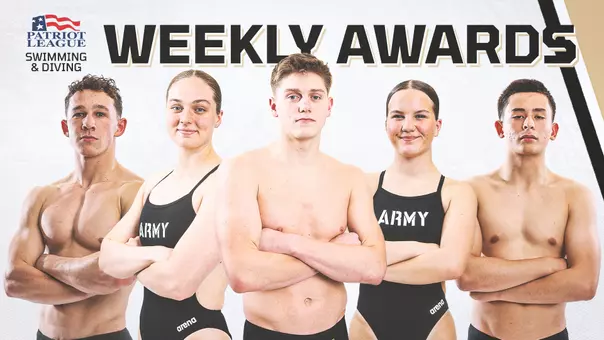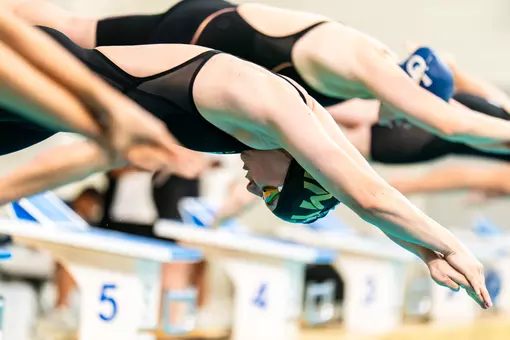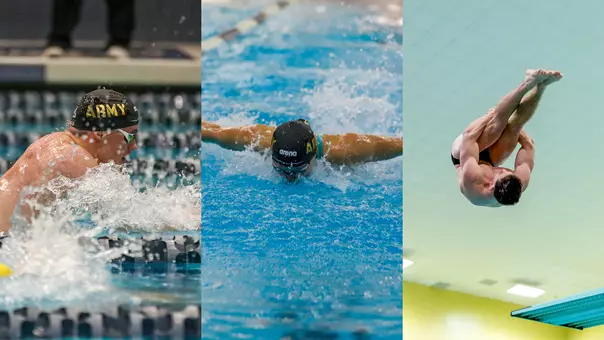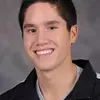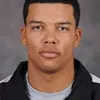Army West Point Athletics
MISSION FIRST: In the Deep End
September 29, 2015 | Men's Swimming and Diving, Athletics
Long before he ever got to West Point, or had even heard of Army West Point's Crandall Pool, Dion Hart lived his life in the deep end. He knew intuitively that meant he had better learn to swim, in the pool and out of it. Even as life lessons bombarded Dion Hart like incoming fire, he found a way not only to stay afloat, to dodge discouragement and dysfunction, but to keep moving water and everything else out of the way, powered by the example of the one person he could always count on, his mother, Leah Chavez, who gave birth to him when she was 14 years old.
People in her family told Leah Chavez she should abort the pregnancy, think hard about giving the baby up for adoption. She was kicked out of her home, got nothing from the baby's father, spent 10 terrifying days at the hospital when Dion was a newborn in an oxygen tent, fighting for breath against a respiratory virus. Leah Chavez, a sexual-abuse survivor, wound up living with her baby in a crack house and other sorry outposts in the poorest precincts in Phoenix. She wound up getting by with food stamps and public assistance.
But she had her son, and he had her, and now look.
Now that baby boy is a 22-year-old West Point graduate, a stalwart on the Army West Point swim team whose teammates became the family he never had, a 6-0, 185-pound man with an Economics degree and a commission as a second lieutenant. Dion Hart wants to be an engineer diver, water apparently coursing deep into his soul. More than anything, he wants to honor Leah Chavez.
"My mother dropped everything in her life to support me," Hart says. "She never gave up wanting to be my mother. She was the one to teach me that if you want something you have to be the one to make it happen. I wake up every morning with the intent to work towards achieving my goals because I know it will reinforce the fact that my mother was the best mother I could have ever asked for."
Says Leah Chavez, "Before I had my son I could care less about living. He did not ask to come into this world. I told myself I was going to protect him at all costs. My strength came from my son." She pauses and tries to steady a voice choked with emotion.
"I am very proud of him," Chavez says.
Leah Chavez has a saying, and repeated it often to her son. "Everything starts small," she would say. You take a step, and then another. She would eventually get married and have four other children, and heeded her own advice. It was never easy. Dion's life had all the stability of a desert tumbleweed. In fifth grade he was tormented by bullies who called him a mistake and beat him up in the bathroom, and spit in his hair. They mocked him because he loved to dance – ballet, tap, jazz, you name it. As Dion got older he stayed with a grandfather who he said was so worried about money and Dion's voracious appetite that he would lock up the food in his bedroom. Dion spent a few hungry months there, and moved on.
Movement was a constant. Hart would hear other kids talk about their families, their traditions and vacations, and wondered what that would be like. He never felt sorry for himself. As he got older, he shared his life journey with only the closest of friends and teammates, among them Dan Borchik, a former West Point swimming teammate who is now a United States Army lieutenant based in Savannah, Ga.
"I'm sure there are a lot of people he's around every single day who don't even know about (what he went through)," Borchik says. "I've tried to eliminate complaining and making excuses in my life, and a lot of that has to do with Dion. He had all the cards against him, everything in the world against him, and has still been able to achieve and do great things."
Hart, who had started swimming recreationally as a young child, decided in middle school he wanted to be in the military, and wanted to be a leader, to his four younger siblings and anybody else he might positively impact. You have to get your education first, his mother told him. He studied hard and started to swim fast, emerging as a top area competitor though he'd only competed out of a public pool. He went to a summer swimming camp at the United States Naval Academy as a junior, lining up the requisite recommendations.
When he finally joined a club team, his times plummeted, Navy recruited him and Hart verbally committed. He was all set to head to Annapolis when he came across a story in Forbes magazine about West Point and its leadership record. Hart decided he wanted to visit.
The coaches at the Naval Academy tried hard to dissuade him, saying that there was no point. Hart knew that, judging by records and rankings, that Navy had a stronger swimming program, but this was not a decision that was going to be based on numbers.
Something in his heart told him he needed to check out West Point. Dan Borchik was Hart's host. They walked around the campus, visited Trophy Point, the majestic Hudson overlook on campus. It was snowing. It was perfect. Hart met the guys on the team and felt as if he were part of a brotherhood almost immediately.
"Dion really embraced the family aspect and the camaraderie from the beginning," says Mickey Wender, the Army West Point swimming coach. "He is tough, he's selfless and has this ability to connect with people. He's just a loving, soft-hearted guy with a heart of gold who is a great athlete, the kind of person who makes any team better."
Hart knew this is where he wanted to be. He told Chris Maiello, the Navy assistant who was recruiting him, that he was sorry, but he had changed his mind.
"You're making the biggest mistake of your life," Hart says Maiello told him. Hart did not agree.
That does not mean that life on the banks of the Hudson was easy. Early on, Hart got kicked out of an English class because he didn't have a rough draft of a paper. He got disciplined for it, and then got in more trouble when he displayed a shortage of contrition and ownership.
"I had attitude," Hart says, a faint smile crossing his face.
There were times he'd see photos of friends on Facebook, being college kids and partying on spring break, and he'd have a passing pang or two, but it wouldn't last. The team and the bond he felt, the family he was finally a part of, always pulled him through, always made him feel connected. With his mother so far away and not having the means to get back to Arizona, he was often invited to spend holidays with teammates, such as fellow swimmer and classmate, Michael Dustin. Everybody always included him.
"I'm sure he appreciates that more than most with some of what he's been through," Wender says.
Hart's swimming specialties were as a freestyle and breast-stroker, and his sub-specialty was being the team's resident entertainer. He would break into dance without warning, his energy and enthusiasm spilling to all corners of Crandall Pool, which, over four years, became much more than a rectangular body of water to Hart.
It became a place of refuge, the home of a chlorinated brotherhood. When his final year in the pool ended with the Black Knights placing second in the Patriot League, and second in the Eastern Collegiate Athletic Conference Championships, it was bittersweet for Hart. There was pride in how the team finished, but sadness that the end to his West Point swimming career had come.
From start to finish, Dion Hart loved the challenge of putting it all out there, touching the wall as fast as he could, giving his mother one more reason to be proud, and to honor her example.
"She's my role model in everything I do," Dion Hart says.
People in her family told Leah Chavez she should abort the pregnancy, think hard about giving the baby up for adoption. She was kicked out of her home, got nothing from the baby's father, spent 10 terrifying days at the hospital when Dion was a newborn in an oxygen tent, fighting for breath against a respiratory virus. Leah Chavez, a sexual-abuse survivor, wound up living with her baby in a crack house and other sorry outposts in the poorest precincts in Phoenix. She wound up getting by with food stamps and public assistance.
But she had her son, and he had her, and now look.
Now that baby boy is a 22-year-old West Point graduate, a stalwart on the Army West Point swim team whose teammates became the family he never had, a 6-0, 185-pound man with an Economics degree and a commission as a second lieutenant. Dion Hart wants to be an engineer diver, water apparently coursing deep into his soul. More than anything, he wants to honor Leah Chavez.
"My mother dropped everything in her life to support me," Hart says. "She never gave up wanting to be my mother. She was the one to teach me that if you want something you have to be the one to make it happen. I wake up every morning with the intent to work towards achieving my goals because I know it will reinforce the fact that my mother was the best mother I could have ever asked for."
Says Leah Chavez, "Before I had my son I could care less about living. He did not ask to come into this world. I told myself I was going to protect him at all costs. My strength came from my son." She pauses and tries to steady a voice choked with emotion.
"I am very proud of him," Chavez says.
? ? ?
Leah Chavez has a saying, and repeated it often to her son. "Everything starts small," she would say. You take a step, and then another. She would eventually get married and have four other children, and heeded her own advice. It was never easy. Dion's life had all the stability of a desert tumbleweed. In fifth grade he was tormented by bullies who called him a mistake and beat him up in the bathroom, and spit in his hair. They mocked him because he loved to dance – ballet, tap, jazz, you name it. As Dion got older he stayed with a grandfather who he said was so worried about money and Dion's voracious appetite that he would lock up the food in his bedroom. Dion spent a few hungry months there, and moved on.
Movement was a constant. Hart would hear other kids talk about their families, their traditions and vacations, and wondered what that would be like. He never felt sorry for himself. As he got older, he shared his life journey with only the closest of friends and teammates, among them Dan Borchik, a former West Point swimming teammate who is now a United States Army lieutenant based in Savannah, Ga.
"I'm sure there are a lot of people he's around every single day who don't even know about (what he went through)," Borchik says. "I've tried to eliminate complaining and making excuses in my life, and a lot of that has to do with Dion. He had all the cards against him, everything in the world against him, and has still been able to achieve and do great things."
Hart, who had started swimming recreationally as a young child, decided in middle school he wanted to be in the military, and wanted to be a leader, to his four younger siblings and anybody else he might positively impact. You have to get your education first, his mother told him. He studied hard and started to swim fast, emerging as a top area competitor though he'd only competed out of a public pool. He went to a summer swimming camp at the United States Naval Academy as a junior, lining up the requisite recommendations.
When he finally joined a club team, his times plummeted, Navy recruited him and Hart verbally committed. He was all set to head to Annapolis when he came across a story in Forbes magazine about West Point and its leadership record. Hart decided he wanted to visit.
The coaches at the Naval Academy tried hard to dissuade him, saying that there was no point. Hart knew that, judging by records and rankings, that Navy had a stronger swimming program, but this was not a decision that was going to be based on numbers.
Something in his heart told him he needed to check out West Point. Dan Borchik was Hart's host. They walked around the campus, visited Trophy Point, the majestic Hudson overlook on campus. It was snowing. It was perfect. Hart met the guys on the team and felt as if he were part of a brotherhood almost immediately.
"Dion really embraced the family aspect and the camaraderie from the beginning," says Mickey Wender, the Army West Point swimming coach. "He is tough, he's selfless and has this ability to connect with people. He's just a loving, soft-hearted guy with a heart of gold who is a great athlete, the kind of person who makes any team better."
Hart knew this is where he wanted to be. He told Chris Maiello, the Navy assistant who was recruiting him, that he was sorry, but he had changed his mind.
"You're making the biggest mistake of your life," Hart says Maiello told him. Hart did not agree.
That does not mean that life on the banks of the Hudson was easy. Early on, Hart got kicked out of an English class because he didn't have a rough draft of a paper. He got disciplined for it, and then got in more trouble when he displayed a shortage of contrition and ownership.
"I had attitude," Hart says, a faint smile crossing his face.
There were times he'd see photos of friends on Facebook, being college kids and partying on spring break, and he'd have a passing pang or two, but it wouldn't last. The team and the bond he felt, the family he was finally a part of, always pulled him through, always made him feel connected. With his mother so far away and not having the means to get back to Arizona, he was often invited to spend holidays with teammates, such as fellow swimmer and classmate, Michael Dustin. Everybody always included him.
"I'm sure he appreciates that more than most with some of what he's been through," Wender says.
Hart's swimming specialties were as a freestyle and breast-stroker, and his sub-specialty was being the team's resident entertainer. He would break into dance without warning, his energy and enthusiasm spilling to all corners of Crandall Pool, which, over four years, became much more than a rectangular body of water to Hart.
It became a place of refuge, the home of a chlorinated brotherhood. When his final year in the pool ended with the Black Knights placing second in the Patriot League, and second in the Eastern Collegiate Athletic Conference Championships, it was bittersweet for Hart. There was pride in how the team finished, but sadness that the end to his West Point swimming career had come.
From start to finish, Dion Hart loved the challenge of putting it all out there, touching the wall as fast as he could, giving his mother one more reason to be proud, and to honor her example.
"She's my role model in everything I do," Dion Hart says.
Players Mentioned
Army vs. Loyola (MD) Women's Basketball Game Highlights
Thursday, February 19
Army vs. American Women's Basketball Highlights
Wednesday, February 18
Army vs. Yale Men's Lacrosse Game Highlights
Sunday, February 15
Army vs. Marist Women's Lacrosse Game Highlights
Wednesday, February 11

